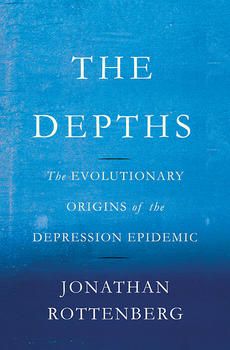
Depression
The Come Out of the Dark Campaign: An Introduction
A campaign to raise awareness and crush depression stigma
Posted November 24, 2013
Our national conversation about depression for the last twenty years has been on hold, largely reduced to a narrow dialogue about the promise and peril of antidepressants: “To Prozac, or not to Prozac?” Peter Kramer’s Listening to Prozac raised expectations that antidepressants would soon make depression obsolete. As this proved not to be the case, there was the predictable backlash. In Robert Whitaker’s Anatomy of an Epidemic, antidepressants (and other psychotropic medications) are not only ineffective, but the villain, responsible for worsening the epidemic of mental illness. The next movement will be a backlash to the backlash. If we do nothing different, we can conclude with supreme confidence that all the heated talk about drugs will continue to monopolize the stage and preclude a real conversation about mood and mood disorders.
I am a depression researcher and former depression sufferer who has been moved to try to improve the sad state of our national dialogue. I am using social media, particularly Facebook and Twitter to start a movement of people committed to changing the conversation about depression. We desperately need this not only for adults. We also desperately need it for my daughter, Sophie, and for the rest of her generation, the teens who will soon be young adults. Our youth will face depression in high schools and on college campuses in epidemic proportions that will overwhelm them, their parents, and all counseling resources.
Why haven’t we had this conversation already? The continued ascendance of the conventional disease model of depression has been one factor limiting us so far. My new book, The Depths, challenges this conventional approach, which tends to view the legions of the depressed and the formerly depressed as a “broken” people, an ever-afflicted group that will likely need repeated assistance over the life course because of their theorized defects. The biological defect model may have been created with good intentions, but it is both belittling and inaccurate. Depression like any mood state has a biology of course but it is simply not a disease in the same sense that Parkinson’s Disease is. To try to maintain that depression is a brain disease is to cut off a more interesting conversation at the knees.
The Depths challenges the view that depressed people are defective

The Depths challenges the view that depressed people are defective
A second major obstacle to a more affirmative national conversation is that depression has lacked a unifying public symbol that could bring it out of the dark like Livestrong© bracelets did for cancer or the rainbow flag did for LGBT. When most people think of depression, their first associations are to unfortunate images, such as a dark cloud, the color black, or a noose. One reason that depression stigma lives is that depression has a serious bumper sticker problem.
But this is essentially an issue of failed marketing and messaging. It is very hard to talk about depression when it is always on societies’ terms. Depressed and formerly depressed people are ever on the defensive. To change the terms of the debate, and spark more productive conversation, I developed a unifying symbol to function in a depression anti-stigma campaign. These are glow-in-the-dark wristbands that are printed with the phrase COME OUT OF THE DARK.

In July of 2013, I was using my Facebook page to probe for interest in these wristbands and I made an offer that I would give away one to any person who would be willing to send me a picture of themselves wearing it. I bought 200 bands from China and planned to give them away from time to time to readers who were interested. Initial response was rather tepid and I started to think it would be complete flop. For reasons that I do still do not completely understand, the wristbands went viral on the internet, and I was flooded with 3,000 requests from all over the world.
I received requests from parents for their depressed children. From people who lost loved ones to suicide. From teachers for their classrooms. From therapists for their patients. From counselors for their support groups. And from many individuals who have been touched personally by depression, both those who have conquered depression and those who were still struggling with.
I think that part of the viral appeal of the wristband campaign is the slogan, which has several possible meanings
• Let’s end society’s ignorance about depression.
• Let’s support depressed people so they get well and stay well.
• Let’s create an environment where people can speak freely about depression and no one feels compelled to conceal their pain.
And part of the appeal is that total strangers are giving you something for free that will make you feel more comfortable living in your own skin.
With the help of a dynamic student organization we have now distributed well over 5,000 of these wristbands.
If you look at this gallery of the first wave of people who have come out of the dark, I think you can more easily understand why this campaign has taken on a life of its own. It’s both a social media campaign and a word-of-mouth campaign—both of which inevitably will shift the conversation about depression on more favorable terms.

The great response to the first wave of the Come-Out-of-The-Dark campaign so far tells me that change is in the wind. People are tired of hiding, tired of hedging. They are ready to reclaim their identities as fully human.
The stakes are high. Conservatively, 13 million US adults are currently in an episode of depression; more than twice that number have had depression in the past. When we add in caregivers, millions more are indirectly affected by the quality and the quantity of our national dialogue about depression.
But we have the momentum. With your help, I give the stigma of depression about another six months to live.

Join our growing movement to crush stigma and raise depression awareness. There are many opportunities to get involved and give voice to depression. Please write us at comeoutofthedark@gmail.com if you want to help spread the word. And yes, it's possible to sign up to receive a free wristband. (US addresses).



